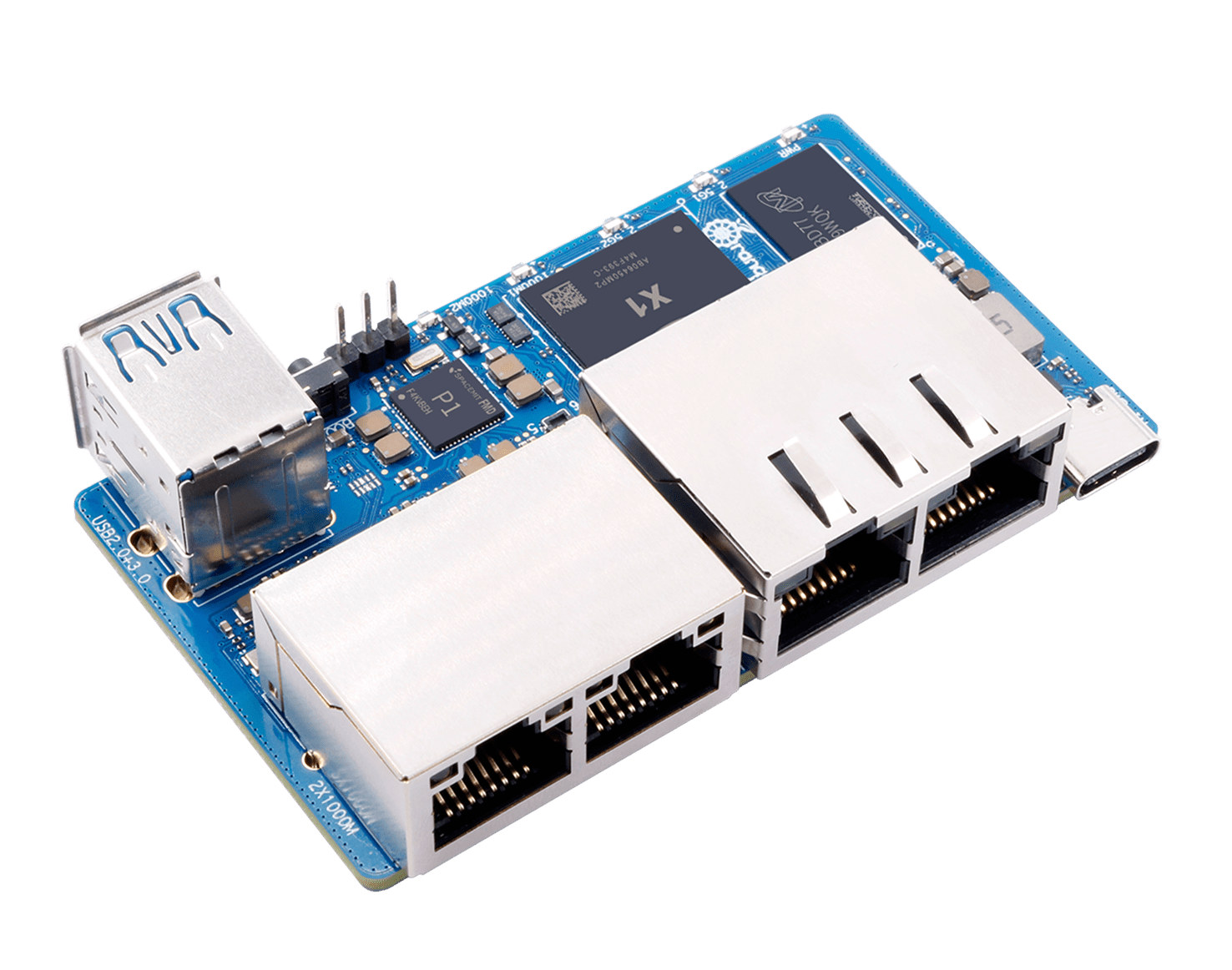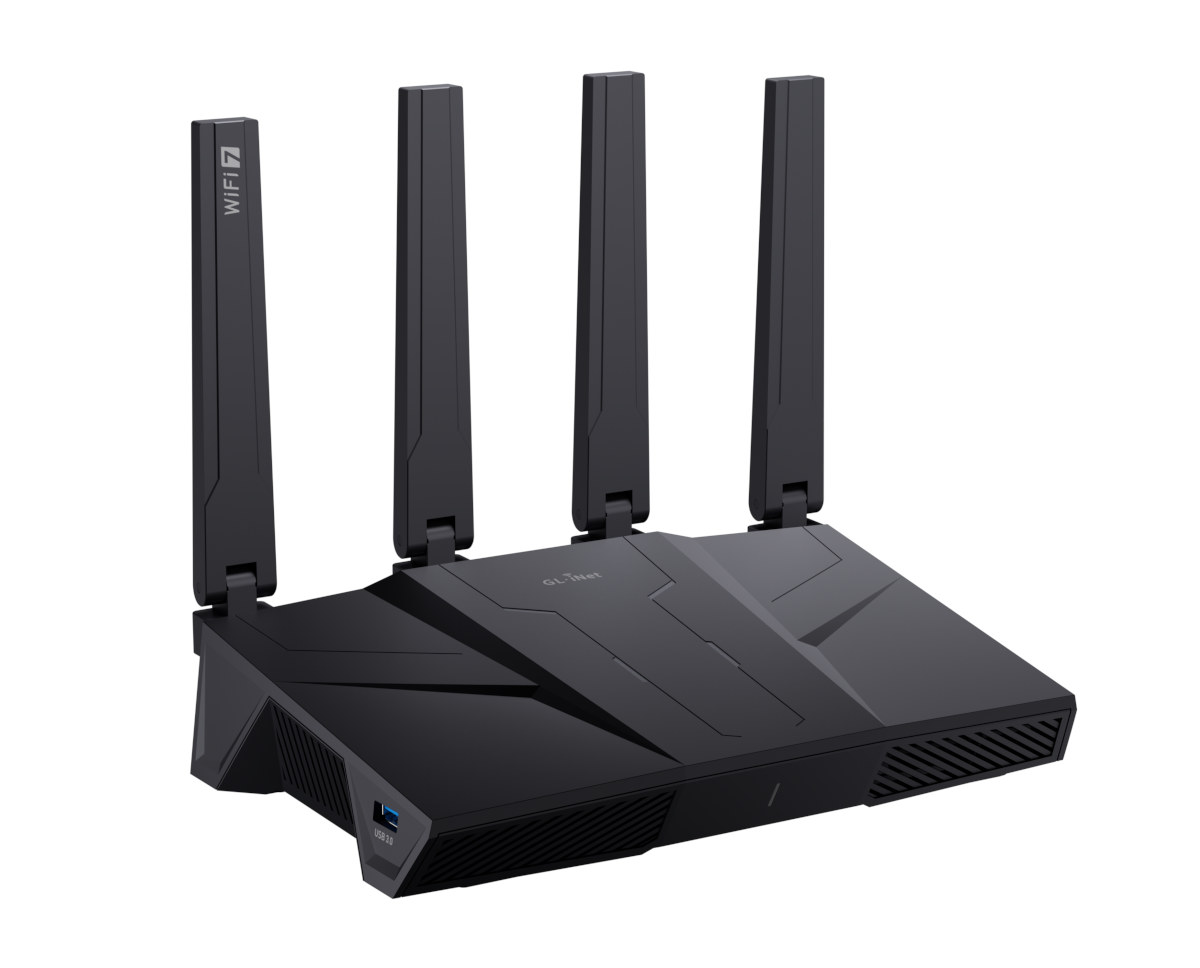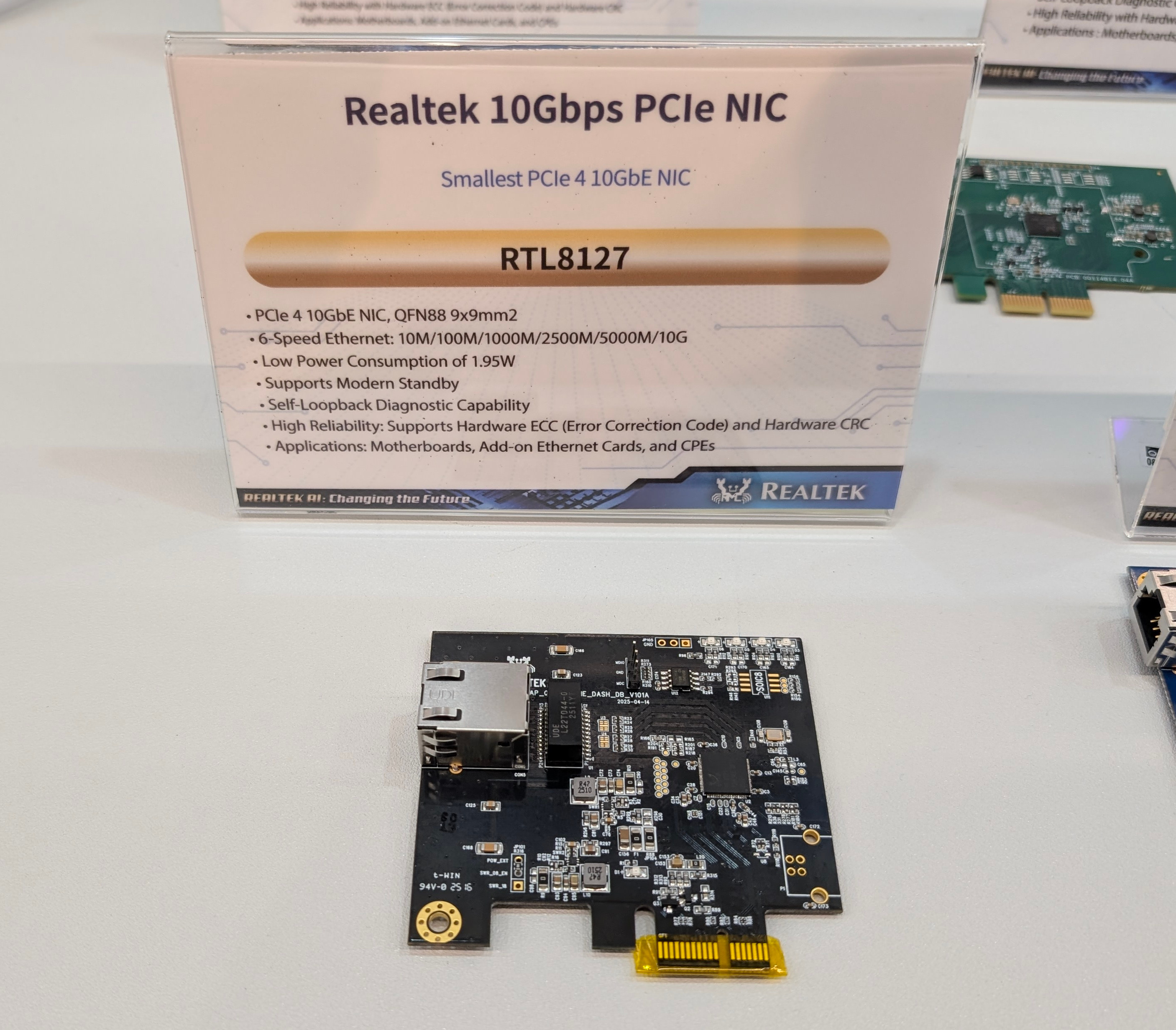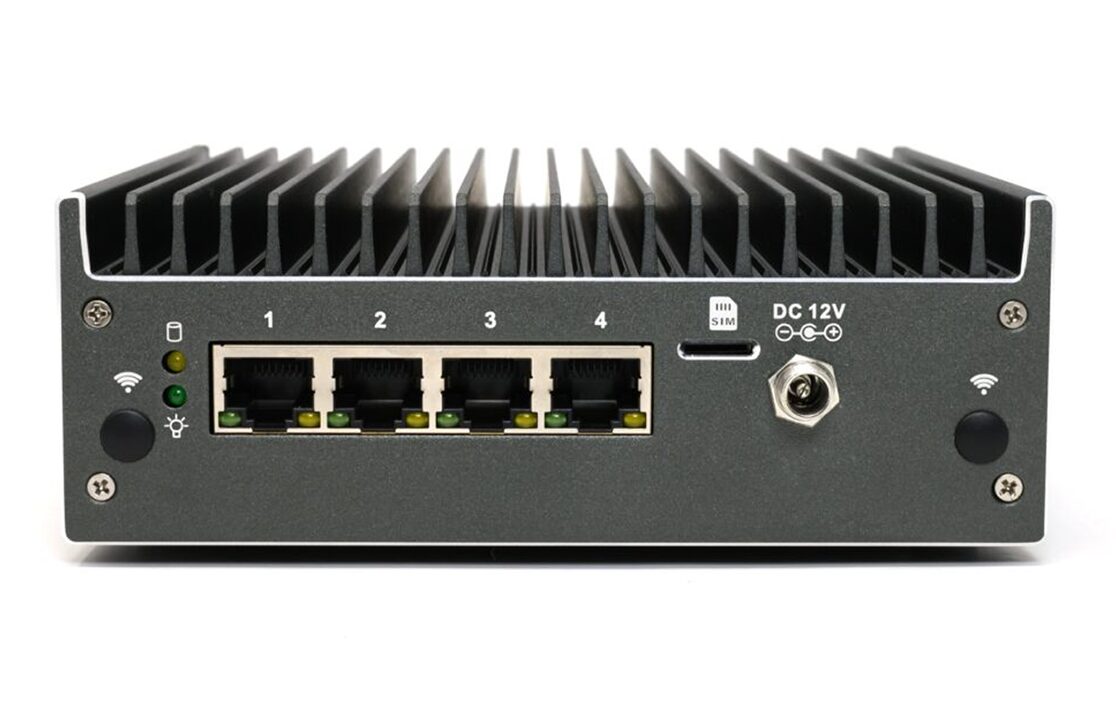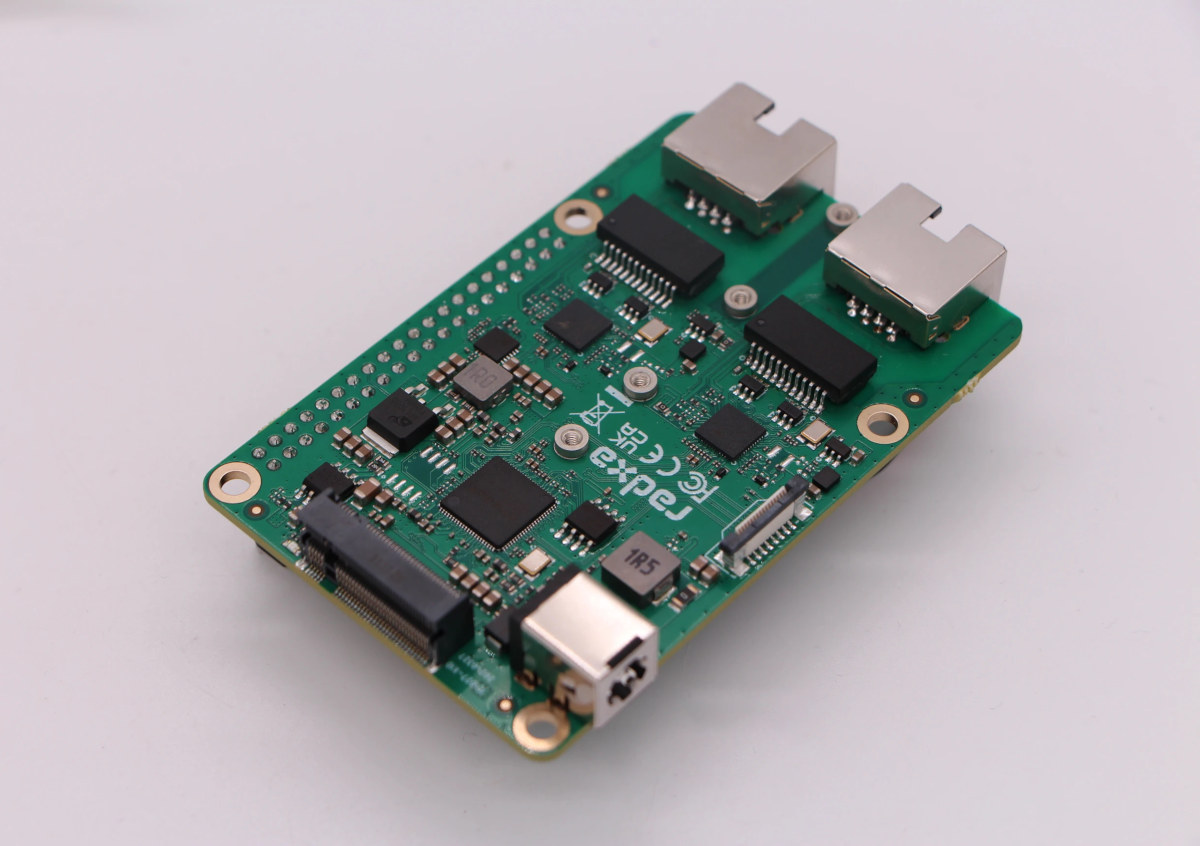Orange Pi has released two RISC-V boards so far: the Orange Pi RV with a StarFive JH7110 quad-core SoC, and the Orange Pi RV2 with a Ky X1 octa-core processor, either a clone of the SpacemIT K1/M1 SoC or one with different CPU markings. The third RISC-V board from the company, named Orange Pi R2S, also features a Ky X1 RISC-V SoC, but is designed for headless and networking applications with two 2.5GbE ports, two GbE ports, and two USB 3.0/2.0 ports, and not much else. Orange Pi R2S specifications: SoC – Ky X1 CPU – 8-core X60 RISC-V (RV64GCVB) processor @ 1.6 GHz GPU – Imagination IMG BXE-2-32 @ 819 MHz with support for OpenGL ES3.2, Vulkan 1.3, OpenCL 3.0; 20 GFLOPS VPU H.265, H.264, VP8, VP9, MPEG4, MPEG2 decoder up to 4K @ 60fps H.265, H.264, VP8, VP9 encoder up to 4K @ 30fps Support simultaneous processing 1080p60 […]
GL.iNet Flint 3 (GL-BE9300) is an affordable tri-band WiFi 7 router with 5 2.5GbE ports
The GL.iNet Flint 3 (codenamed GL-BE9300) is an affordable tri-band WiFi 7 BE9300 router with five 2.5GbE RJ45 ports supporting 10Gbps aggregation, and now available for pre-order for $119 to $159. It follows the lower-end GL.iNet Slate 7 (GL-BE3600) WiFi 7 dual-band travel router introduced a few months ago. The tri-band WiFi 7 router is powered by a 1.5 GHz quad-core Qualcomm processor coupled with 1GB RAM and 8GB eMMC flash for the OS, features a USB 3.0 port for smartphone tethering or cellular dongle, and supports up to 680 Mbps VPN throughput using WireGuard or OpenVPN. Other features include AdGuard Home, failover, load balancing, and more. GL.iNet Flint 3 specifications: CPU – Qualcomm quad-core @1.5 GHz; unamed, but likely Qualcomm IPQ5332 Memory – 1 GB DDR4 Storage – 8 GB eMMC flash Networking WiFi 7 Protocol – IEEE 802.11a/b/g/n/ac/ax/be Wi-Fi Speed – 688Mbps (2.4GHz), 2882Mbps (5GHz), 5765Mbps (6GHz) 4x […]
Linux 6.15 Release – Main changes, Arm, RISC-V and MIPS architectures
Linus Torvalds has just announced the release of Linux 6.15: So this was delayed by a couple of hours because of a last-minute bug report resulting in one new feature being disabled at the eleventh hour, but 6.15 is out there now. Apart from that final scramble, things looked pretty normal last week. Various random small fixes all over, with drivers as usual accounting for most of it. But we’ve got some bcachefs fixes, some core networking, and some mm fixes in there too. Nothing looks particularly scary. And this obviously means that the merge window opens tomorrow as usual, and I see the usual people being proactive and having sent me their pull requests. It’s memorial day tomorrow here in the US, but like the USPS, “neither snow nor rain nor heat nor gloom of night” – nor memorial day – stops the merge window. [ Actually, thinking back […]
Realtek RTL8127, RTL8159, and RTL8261C will power low-cost, efficient 10 Gbps Ethernet cards, USB adapters, and switches
Realtek showcased RTL8126, RTL8157, and RTL8251B 5 Gbps Ethernet solutions at Computex 2023, and the first Realtek RTL8126 5 Gbps Ethernet PCIe and M.2 adapters were introduced in 2024, shortly followed by RTL8157 5GbE USB 3.2 adapters. The company has now unveiled upgraded solutions for 10 Gbps Ethernet networking at Computex 2025 with the RTL8127 10GbE PCIe controller and variants, the RTL8159 10GbE USB 3.2 Gen 2×2 controller, and the RTL8261C PHY for 10GbE switches. Realtek RTL8127 10GbE PCIe NIC Realtek RTL8127 specifications: Ethernet – 10Mps, 100Mps, 1000Mps, 2500Mps, 5000Mps, and 10Gbps Host interface – PCIe Gen4 Features Modern standby Self loopback diagnostic Hardware ECC and CRC Power consumption – 1.95 Watts Package – 9×9 mm QFN88 The Realtek RTL8127 will be found in PCIe and M.2 cards, or directly soldered on motherboards or CPEs. The good news is the low power consumption, which should make cooling easier and cheaper […]
Protectli Vault Pro VP2430 – An Intel N150 fanless network appliance with four 2.5GbE ports, four video outputs
The Protectli Vault Pro VP2430 is a compact, Intel Processor N150-based fanless network appliance designed for firewall, router, and virtualization applications in home labs, small businesses, and edge deployments. The system supports up to 64GB DDR5-4800 memory via a single SO-DIMM slot and features various storage options, including a 32GB onboard eMMC flash, an M.2 2280 NVMe SSD slot, and a SATA 3.0 interface for 2.5″ SSDs. It comes with four 2.5GbE Intel I226-V Ethernet ports and includes video outputs via HDMI 2.0, DisplayPort 1.2, and two USB-C with DisplayPort functionality. It also features M.2 slots for WiFi and 4G/5G modem, to work with the module, there is also a Nano SIM slot. Additionally, it has multiple internal headers, including GPIO, COM, SATA, and eSPI for expansion. On top of that, the system supports both AMI and coreboot BIOS options, and TPM 2.0 for security, making it ideal for secure […]
Banana Pi BPI-RV2 is a low-cost RISC-V router with a 2.5GbE port and five gigabit Ethernet ports
We briefly mentioned the Banana Pi BPI-RV2 router in our article about the Siflower SF21H8898 quad-core 64-bit RISC-V SoC designed for industrial gateways, routers, and controllers. But we now have more information about Banana Pi’s latest RISC-V router, and it’s available for purchase for $34.50 on AliExpress. So let’s have a closer look. The Banana Pi BPI-RV2 ships with 512MB DDR3 RAM, 128 MB SPI NAND, and 16 MB SPI NOR flash for storage redundancy. The router features one 2.5GbE port with optional PoE support, five gigabit Ethernet ports, an M.2 2242/2230 PCIe Gen 2 x1 interface for NVMe SSD storage, and a mini PCIe socket for a WiFi module. Banana Pi BPI-RV2 specifications: SoC – Siflower SF21H8898 quad-core 64-bit RISC-V @ 1.25GHz System Memory – 512MB DDR3 Storage 128 MB SPI NAND Flash for U-Boot and Linux 16 MB SPI NOR flash for U-Boot and Linux; write protected by […]
CM5-DUAL-ETH-MINI-BOX is a dual gigabit Ethernet router box for the Raspberry Pi CM5
Waveshare CM5-DUAL-ETH-MINI-BOX is a dual gigabit Ethernet router box designed for the Raspberry Pi CM5. It offers a familiar design with a metal enclosure that looks suspiciously similar to FriendlyELEC’s family of NanoPi routers powered by Rockchip processors, such as the NanoPi R2S Plus or NanoPi R3S. The router also features a microSD card slot to boot the OS on the Raspberry Pi CM5 Lite, a USB 3.0 Type-A port, a USB Type-C port for power and eMMC flash programming, power and boot buttons, and a 40-pin GPIO header accessible without opening the case (after lifting a cover). CM5-DUAL-ETH-MINI-BOX specifications: Supported SoMs – Raspberry Pi CM5 and CM5 Lite, and potentially compatible alternatives like the Raspberry Pi CM4, Orange Pi CM5, Radxa CM5, etc… Networking 2x Gigabit Ethernet RJ45 ports: one GbE exposed directly through the CM5 board-to-board connector, and the other via a RealTek RTL8111H PCIe controller WiFi 5 […]
Radxa Dual 2.5G Router HAT adds 2.5GbE networking and M.2 NVMe storage support to Raspberry Pi 5-compatible SBCs
The Radxa Dual 2.5G Router HAT is an expansion board adding 2.5GbE networking and an M.2 PCIe x1 socket for NVMe SSD storage to the Raspberry Pi 5 and compatible SBCs with a PCIe FFC connector. We had previously seen Raspberry Pi 5 HATs with 2.5GbE such as the Pineberry HatNET! 2.5G, or even one with 2.5GbE and NVMe SSD (52Pi W01 U2500 HAT), but the Radxa Dual 2.5G Router HAT is the first to implement two 2.5 Gbps Ethernet ports to enable routing, and also features an NVMe SSD as a bonus. Radxa Dual 2.5G Router HAT specifications: Supported SBCs – Raspberry Pi 5, Radxa ROCK 2F, Radxa ROCK 2A, Radxa ROCK 5C, the upcoming Radxa 4D (RK3576), and potentially others PCIe Switch – ASM2806 PCIe 3.0 switch chip with PCIe Gen3 x2 upstream and four PCIe 3.1 lanes downstream up to 8GT/s Storage – 1x M.2 M-Key socket […]


